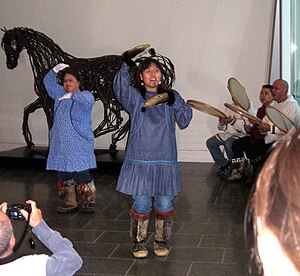

Native American identity in the United States is a community identity, determined by the tribal nation the individual or group belongs to.[1][2] While it is common for non-Natives to consider it a racial or ethnic identity, for Native Americans in the United States it is considered to be a political identity, based on citizenship and immediate family relationships.[1][2] As culture can vary widely between the 574 extant federally recognized tribes in the United States, the idea of a single unified "Native American" racial identity is a European construct that does not have an equivalent in tribal thought.[1]
While some groups and individuals seek to self-identify as Native American, self-identification on its own is not recognized by legitimate tribes.[1][3][2] There are a number of different factors which have been used by non-Natives to define "Indianness," and the source and potential use of the definition play a role in what definitions have been used in their writings, including culture, society, genes/biology, law, and self-identity.[4] Peroff asks whether the definition should be dynamic and changeable across time and situation, or whether it is possible to define "Indianness" in a static way,[5] based in how Indians adapt and adjust to dominant society, which may be called an "oppositional process" by which the boundaries between Indians and the dominant groups are maintained. Another reason for dynamic definitions is the process of "ethnogenesis", which is the process by which the ethnic identity of the group is developed and renewed as social organizations and cultures evolve.[5] The question of identity, especially Indigenous identity, is common in many societies worldwide.[5]
- ^ a b c d Kimberly TallBear (2003). "DNA, Blood, and Racializing the Tribe". Wíčazo Ša Review. 18 (1). University of Minnesota Press: 81–107. doi:10.1353/wic.2003.0008. JSTOR 140943. S2CID 201778441.
- ^ a b c Furukawa, Julia (May 22, 2023). "Review of genealogies, other records fails to support local leaders' claims of Abenaki ancestry". New Hampshire Public Radio. Retrieved 7 July 2023.
- ^ Cite error: The named reference
RussellClaimwas invoked but never defined (see the help page). - ^ Garroutte (2003), Paredes (1995)
- ^ a b c Peroff (1997) p487
© MMXXIII Rich X Search. We shall prevail. All rights reserved. Rich X Search
